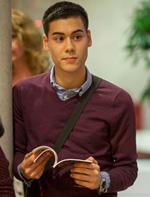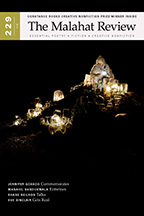Vulnerability as Invulnerability:
Michael Prior in Conversation
with Liz Windhorst Harmer

Photo credit: Jenna Bos
Malahat volunteer and past contributor Michael Prior interviewed Liz Windhorst Harmer on life since winning the Constance Rooke Creative Nonfiction Prize back in 2013 for her piece, "Blip." Harmer's submission went on to receive Gold in the Personal Journalism category at the 34th annual National Magazine Awards in June 2014.
Read her winning interview from 2013.
Click here for details on entering this year's Creative Nonfiction contest.
It's been a year since you won the Constance Rooke Creative Nonfiction Prize for "Blip," which also recently won gold in the Personal Journalism category at the 34th annual National Magazine Awards. I know your work is forthcoming in numerous magazines. Tell us what you've been up to—what new projects are you undertaking, what new exciting things are in your life?
Yes, between the NMA win and the NMA nominations it’s been a pretty exciting year so far. I have short stories forthcoming in Grain and The Dalhousie Review, and an essay coming out in a Creative Nonfiction Anthology. "Blip" is going to be reprinted in a Nonvella anthology, which is great. I'm trying to write a couple of essays, one about working and boredom, and the other about falling in love. I've begun to work on my thesis, a novel, which I'm writing under the mentorship of Charles Foran, and I'm trying to read about quantum physics for that project. Writing, writing, writing. And then we're also moving to Southern California this summer, so that's eating up a lot of my time/energy/brain.
"Blip" deals with several recurring interests in your work: the relationship between pain and self-knowledge, vulnerability as invulnerability, and your own Christian faith. Looking back today, how do you feel about "Blip"? Has your thinking about some of its ideas changed with time? What sort of emotional connection do you have to the writing?
Hmmm. I really like that idea of vulnerability as invulnerability. Feels descriptive of my life in general. My emotional connection to the piece has melded with my emotional connection to the event of mania: I feel wistful and a little bit loving towards them both. The ideas expressed in "Blip" feel true to me still, but are inevitably incomplete.
I would like to write further into it, and perhaps to write a very long piece that ties together some of my experiences with research about the boundaries of madness. Or about people who, for whatever reason, for better or for worse, dodge their diagnoses, and what it’s like to live in a place between sanity and insanity.
In the writing workshop we shared, a lot of your work focused on the disjunction between how we perceive ourselves and how others perceive us; "Blip" certainly seems to deal with this divide between the internal and external. Could you speak a bit more about how this informs your writing process?
I am going to have to reread it with all of these wonderful insights in mind! What's funny about that realization in workshop is that everyone could see that my work was preoccupied with that disjunction and I did not know it myself. I do seem to write from a strange perspective of narrators who observe themselves observing and wonder about how others are interpreting them.
The other day, my daughter and I were bicycling and we found these tiny baby birds that had fallen from a nest and died. One was squashed, dead, and we were about to leave when I noticed that the other was faintly moving. I realized that as I was watching the bird and explaining it to Fiona, I was also grappling with an ethical quandary (I didn't want to put it out of its evident misery), as I was also trying to absorb all of the details of its appearance and realizing that I was misperceiving it, superimposing on it the look of a toad we had seen earlier, seeing legs where there were proto-wings. Perhaps every moment is pregnant with meaning, and writing gives me first of all the desire to look closely, and the means by which I might explore ideas. It is a way of watching myself watch, which, now that I say it, seems a lot more self-absorbed than I would hope to be.
You're currently a fiction editor at Echolocation Magazine, the University of Toronto's graduate creative writing journal. How has working at the magazine, looking through submissions, and judging the annual chapbook contest changed your outlook on submitting your own work?
Especially since we use Submittable, which I also use for my own submissions, I felt I was seeing the process from the inside; it felt like a kind of x-ray view. As I read subs, I was simply looking to find work that I loved, and so were the other editors, and that makes me trust the process a little more now. It seems, if little less magical or godlike, a little more humane.
Only a few months before "Blip" came out, you published a nonfiction piece in The New Quarterly ("Pain: A Brief History of My Intensity") that was awarded runner-up in their Edna Staebler Personal Essay Contest. How have these awards affected your writing life? Do you have any advice for entrants of the Malahat’s upcoming Constance Rooke Creative Nonfiction Prize?
As far as these things go, 2013 was a year of dreams, when I suddenly was getting happy responses to my work when I had previously met with stony silence. I don't know that winning awards or placing in contests has affected my writing so much as it has given me a necessary breath of confidence. It was amazing to find I'd won and to hear from people who'd read it, and especially to read John Vaillant's comments. That kind of response feels like nothing else—it's something close to feeling that you've really been heard.
And advice. Well, I don't really know how I won! I wrote the best piece I could and sent it out into the world. Other people read it for me, and I revised. The best advice is always to read and write and read and write. There's no formula.

Michael Prior
* * * * * * * *









